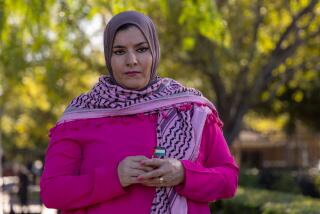Loves Freedom, Hates the Cartoons
- Share via
This isn’t a definitive dispatch from the Arab Street, even though the intersection of Brookhurst and Orange in Anaheim could qualify as one.
Rather, it’s just my report of a Tuesday-morning conversation with 47-year-old Mohammad Abdalla, a Palestinian who came to America when he was 19. I wanted a close-up look at how a religious controversy can traverse the globe -- in this case from a Copenhagen newspaper office to a meat market in Orange County.
Having never met Abdalla, I didn’t know if I’d find him angry, amused, indifferent or somewhere else on the emotional spectrum as we discussed the international fallout from a Danish newspaper’s decision to publish depictions of the prophet Muhammad, including an especially inflammatory cartoon of him wearing a turban shaped like a bomb.
“There is a line nobody should cross,” Abdalla says calmly. It’s a phrase he’ll come back to more than once. “You cannot imagine and draw something for Muhammad’s picture, to imagine he looks like somebody,” Abdalla says. Islamic teaching forbids depictions of Muhammad, a respect Abdalla says he extends to Moses and Jesus, whom Muslims also consider prophets.
“There are great people,” he says. “You should not even try to imagine how they look.”
Abdalla is steadfast on two points: There can be no middle ground when it comes to publishing caricatures of Muhammad and that responses when it happens should be nonviolent. He says he railed at TV footage of rioters targeting a Catholic church in Beirut and burning cars and storefronts.
While there’s been plenty of angry reaction to the cartoons from the Muslim world, it hasn’t been in lock-step. In speech or print, some have publicly criticized fellow Muslims for overreacting, even while themselves decrying the insensitivity of publishing the cartoons.
Abdalla says he teaches his four children to love and respect Moses and Jesus as well as Muhammad, but adds: “I believe in free speech, to a point. I believe in it, but when it comes to something like this, you have no say-so.”
Even had Muhammad been portrayed in the most flattering light, Abdalla says, it would be wrong. “I don’t want to understand it even if they put him in a beauty contest,” he says. “But to put him in a turban and a bomb on his head, as if that’s his teaching, that’s not the way Islam is.”
I ask why he can’t cut the newspapers some slack and defend their right to print offensive cartoons. “There’s a line,” he says again. “We have the best democracy in the world -- and I’m speaking as an Arab American -- but don’t you think there is a line about how much I could say, for example, about our government? There is a line I should not cross. It is the same way with religion.”
Abdalla sees some good coming from the controversy: more unity among Muslims, lots of sympathetic responses from many in the Christian community.
Not to mention the free pub.
“It’s made the prophet much more popular,” he says. He’s not laughing, but I detect a little cheekiness. “Now a lot of people, even my Mexican friends, are asking me about Muhammad. This has acquainted Muhammad with everybody.”
Abdalla insists he’s optimistic about the future and scoffs at doomsday scenarios of an East-West clash of civilizations, even as others see the current controversy as adding gas to the fire.
“It’s a cloud, and it’s going to disappear very soon,” he says.
While others see the controversy as a free speech issue, Abdalla says the heart of the controversy is a miscalculation of how holy Muhammad is to Muslims. The twain may not meet, but Abdalla says he sees no reason why Judaism, Christianity and Islam can’t coexist peacefully.
When I suggest that concept doesn’t seem to be catching on, Adballa shakes his head and says, “That’s what I don’t understand.”
*
Dana Parsons’ column appears Wednesdays, Fridays and Sundays. He can be reached at (714) 966-7821 or at dana
.parsons@latimes.com. An archive of his recent columns is at www.latimes.com/parsons.
More to Read
Sign up for Essential California
The most important California stories and recommendations in your inbox every morning.
You may occasionally receive promotional content from the Los Angeles Times.













